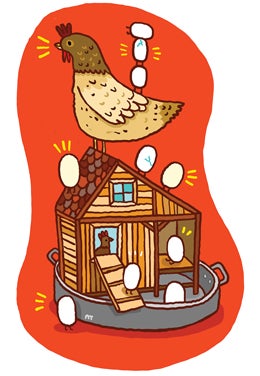 You’ve made the decision: Your household is going sustainable, and it starts with home-grown eggs. Heidi Wright ’90, URI Cooperative Extension’s 4-H program coordinator, says don’t count your chickens before you’ve done your six-step homework:
You’ve made the decision: Your household is going sustainable, and it starts with home-grown eggs. Heidi Wright ’90, URI Cooperative Extension’s 4-H program coordinator, says don’t count your chickens before you’ve done your six-step homework:
1. Zoning Laws: “You don’t want to invest in these chickens and find out you have to rehome them,” Wright says. “It can be tricky, because a lot of cities and towns flip-flop on backyard chickens.”
2. Hen House: Chickens are considered delightful dining by more than humans, so the coop should be sturdy and the chicken run well fenced. Extend the run fence a foot below ground, to discourage digging predators such as foxes, and at least three feet above ground, to discourage climbing predators such as raccoons. You’ll also need a roof to keep wild birds from transmitting disease. Each chicken needs 2.5 to 3 square feet of coop space, and 6 to 8 square feet of run.
3. How Funky is Your Chicken?: Domesticated for thousands of years, chickens come in hundreds of breeds. If you’re all about egg production, try a Red or Black Sexlinks hybrid. Fancy something fancy? The Polish Crested or the Barred Rock are pretty enough for a Martha Stewart Living spread. The cutest little chickens are bantams, while Jersey Giants or Buff Orpingtons are “big, snuggly chickens,” Wright says.
4. No Foul Fowl: Wright advises buying your chickens from a National Poultry Improvement Plan hatchery. Started in the 1930s to combat the spread of salmonella in chicken flocks, NPIP facilities test for a variety of avian diseases. Your local vet, extension office or poultry club can help with advice and resources too.
5. The End of Eggs: Chickens start laying eggs at about 20 weeks and continue producing for up to two years. After that, your chickens will lay inconsistently—but might live another six or seven years. You can send them off to a livestock auction or slaughtering facility, but Wright recommends you sit back and enjoy. “They are like pets, very sociable,” she says. “Sometimes after a stressful day, I put my feet up and watch them do their chicken-y things—pecking, putting an eye to the sky. I had one who was a real gossip. If she heard us talking, she’d run over to see.”
6. Caution: Chickens are addicting, Wright warns, and can lead the unwary deeper into animal husbandry. She’s seen it happen to many a 4-H family that never even owned a dog: “Chickens are gateway livestock.”
 Home
Home Browse
Browse Close
Close Events
Events Maps
Maps Email
Email Brightspace
Brightspace eCampus
eCampus



